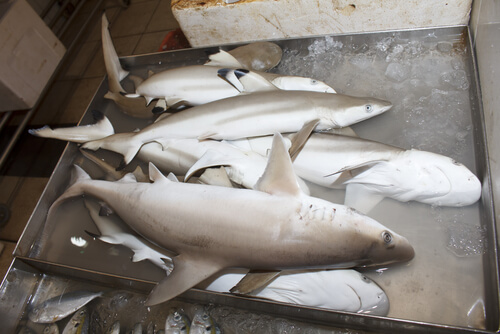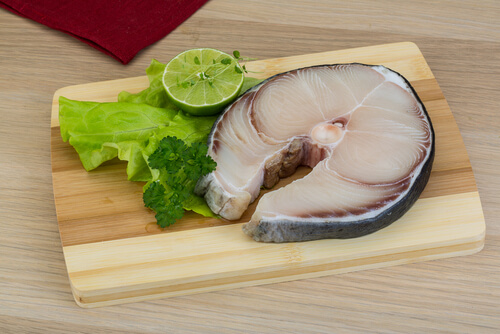Is Shark Meat Safe to Eat?

We’re hearing more and more about different types of animal meat becoming popular to eat. Today we focus on shark meat and ask whether it’s safe to eat. Is it good or bad for your health?
Although human cuisine includes a lot of animal foods, not all of them are suitable for long-term digestion in our bodies. Is it safe to eat shark meat? Here’s the answer.
Why shark meat is eaten
Ever since the arrival of oriental restaurants, people have begun to eat one of their most famous soups (and also one of the most expensive) shark fin soup. For people of various cultures, this meat isn’t only a delicacy for the palate, but also shows a high social status due to its cost.
Sharks are chondrichthyans, a class of aquatic vertebrates commonly known as cartilaginous fish. Sharks themselves are taxonomically classified in the superorder Selachimorpha. More than 500 species have been described, of which a few are considered edible.
For example, the school shark (Galeorhinus galeus), the blue shark (Prionace glauca), the shortfin mako shark (Isurus oxyrinchus), and the bluntnose sixgill shark (Hexanchus griseus) are commonly consumed. In fact, these delicacies are served in many of the best restaurants, although always fried or stewed, as this type of meat isn’t very tasty to eat grilled.
One of the main reasons why shark is consumed, in addition to its price, is because it’s boneless meat. However, its texture is gelatinous and, if the animal is large, it may give off a strong smell of urea, so the most highly prized ones are always small.
Shark meat with too high a urea content is considered toxic and can have harmful effects on the skin, eyes, and respiratory system.
Is it good to eat shark meat?
Although many sharks are considered edible, according to studies there are many species that contain a considerable amount of mercury which could be harmful if we consume it.

The species that were analyzed were the great white shark (Carcharodon carcharias), the dusky shark (Carcharhinus obscurus), among many others, and it was determined that the levels of toxic metals and mercury in their meat were 6 to 10 times higher than what’s allowed according to safety levels. The mean concentration of this toxic agent in the sharks was 2.29 ± 1.77 µg/g.
The question that arose during the studies is how sharks accumulate that level of toxicity in their bodies. The answer seemed simple: due to their large mouths and voracious appetite, they eat everything in their path. In many cases, they unintentionally swallow substances and inedible objects that may have a high metal content.
The kings of the food chain, intoxicated
Beyond the dumping of toxic agents, it must be taken into account that sharks are at the top of the food chain in marine ecosystems. Because of this, they consume fish that are already contaminated with mercury and other toxins and store them in their bodies. With each animal they ingest, the more the concentration of harmful agents in their bodies increases. This phenomenon is known as bioaccumulation.
Although this influences the shark meat we consume, we mustn’t forget that the waste we throw into the sea kills thousands of living creatures every year. Most sharks that have high toxicity in their bodies due to metals are those that feed closer to the coasts, where agricultural waste and garbage from large cities accumulate.
Many may wonder why we continue to consume shark meat if it has already been proven that it can be harmful to us. The main reason is that we tend to follow traditions. There are dishes like the Spanish delicacy cazón en adobo that have existed in Spanish gastronomy for years, and the same is true in the case of other countries with dishes like ceviche.
A tangible threat
As indicated by the prestigious magazine Forbes, many international organizations have recommended that pregnant women and children refrain from consuming shark meat on a regular basis. The European Commission (EC), the World Health Organization (WHO), and Shark Conservation Australia are just a few of them.
According to professional studies, prolonged exposure to mercury can cause damage to the brain and central nervous system and interfere with the cognitive development of fetuses during pregnancy. The maximum “acceptable” mercury concentration in food is 0.5 parts per million, while some shark meats exceed 55 parts per million.
Yes or no to shark meat?
As always, the ultimate decision is up to you. Even so, it’s important to keep in mind that any food that’s intended for consumption must pass certain quality standards.

It also depends on how many options there are to choose from and how much they cost – sad, but true. So, some will think that we’ve been eating shark meat all our lives and so why should we stop now. However, others will be alarmed at these figures.
The other side of the coin
The presence of mercury in shark meat doesn’t only affect us humans. Although it isn’t entirely clear how the poisoning affects the sharks themselves while they’re alive, it’s well-known that their populations are increasingly threatened. As the WWF tells us, up to 25% of sharks near coral reefs are in danger of extinction.
We’re hearing more and more about different types of animal meat becoming popular to eat. Today we focus on shark meat and ask whether it’s safe to eat. Is it good or bad for your health?
Although human cuisine includes a lot of animal foods, not all of them are suitable for long-term digestion in our bodies. Is it safe to eat shark meat? Here’s the answer.
Why shark meat is eaten
Ever since the arrival of oriental restaurants, people have begun to eat one of their most famous soups (and also one of the most expensive) shark fin soup. For people of various cultures, this meat isn’t only a delicacy for the palate, but also shows a high social status due to its cost.
Sharks are chondrichthyans, a class of aquatic vertebrates commonly known as cartilaginous fish. Sharks themselves are taxonomically classified in the superorder Selachimorpha. More than 500 species have been described, of which a few are considered edible.
For example, the school shark (Galeorhinus galeus), the blue shark (Prionace glauca), the shortfin mako shark (Isurus oxyrinchus), and the bluntnose sixgill shark (Hexanchus griseus) are commonly consumed. In fact, these delicacies are served in many of the best restaurants, although always fried or stewed, as this type of meat isn’t very tasty to eat grilled.
One of the main reasons why shark is consumed, in addition to its price, is because it’s boneless meat. However, its texture is gelatinous and, if the animal is large, it may give off a strong smell of urea, so the most highly prized ones are always small.
Shark meat with too high a urea content is considered toxic and can have harmful effects on the skin, eyes, and respiratory system.
Is it good to eat shark meat?
Although many sharks are considered edible, according to studies there are many species that contain a considerable amount of mercury which could be harmful if we consume it.

The species that were analyzed were the great white shark (Carcharodon carcharias), the dusky shark (Carcharhinus obscurus), among many others, and it was determined that the levels of toxic metals and mercury in their meat were 6 to 10 times higher than what’s allowed according to safety levels. The mean concentration of this toxic agent in the sharks was 2.29 ± 1.77 µg/g.
The question that arose during the studies is how sharks accumulate that level of toxicity in their bodies. The answer seemed simple: due to their large mouths and voracious appetite, they eat everything in their path. In many cases, they unintentionally swallow substances and inedible objects that may have a high metal content.
The kings of the food chain, intoxicated
Beyond the dumping of toxic agents, it must be taken into account that sharks are at the top of the food chain in marine ecosystems. Because of this, they consume fish that are already contaminated with mercury and other toxins and store them in their bodies. With each animal they ingest, the more the concentration of harmful agents in their bodies increases. This phenomenon is known as bioaccumulation.
Although this influences the shark meat we consume, we mustn’t forget that the waste we throw into the sea kills thousands of living creatures every year. Most sharks that have high toxicity in their bodies due to metals are those that feed closer to the coasts, where agricultural waste and garbage from large cities accumulate.
Many may wonder why we continue to consume shark meat if it has already been proven that it can be harmful to us. The main reason is that we tend to follow traditions. There are dishes like the Spanish delicacy cazón en adobo that have existed in Spanish gastronomy for years, and the same is true in the case of other countries with dishes like ceviche.
A tangible threat
As indicated by the prestigious magazine Forbes, many international organizations have recommended that pregnant women and children refrain from consuming shark meat on a regular basis. The European Commission (EC), the World Health Organization (WHO), and Shark Conservation Australia are just a few of them.
According to professional studies, prolonged exposure to mercury can cause damage to the brain and central nervous system and interfere with the cognitive development of fetuses during pregnancy. The maximum “acceptable” mercury concentration in food is 0.5 parts per million, while some shark meats exceed 55 parts per million.
Yes or no to shark meat?
As always, the ultimate decision is up to you. Even so, it’s important to keep in mind that any food that’s intended for consumption must pass certain quality standards.

It also depends on how many options there are to choose from and how much they cost – sad, but true. So, some will think that we’ve been eating shark meat all our lives and so why should we stop now. However, others will be alarmed at these figures.
The other side of the coin
The presence of mercury in shark meat doesn’t only affect us humans. Although it isn’t entirely clear how the poisoning affects the sharks themselves while they’re alive, it’s well-known that their populations are increasingly threatened. As the WWF tells us, up to 25% of sharks near coral reefs are in danger of extinction.
This text is provided for informational purposes only and does not replace consultation with a professional. If in doubt, consult your specialist.








